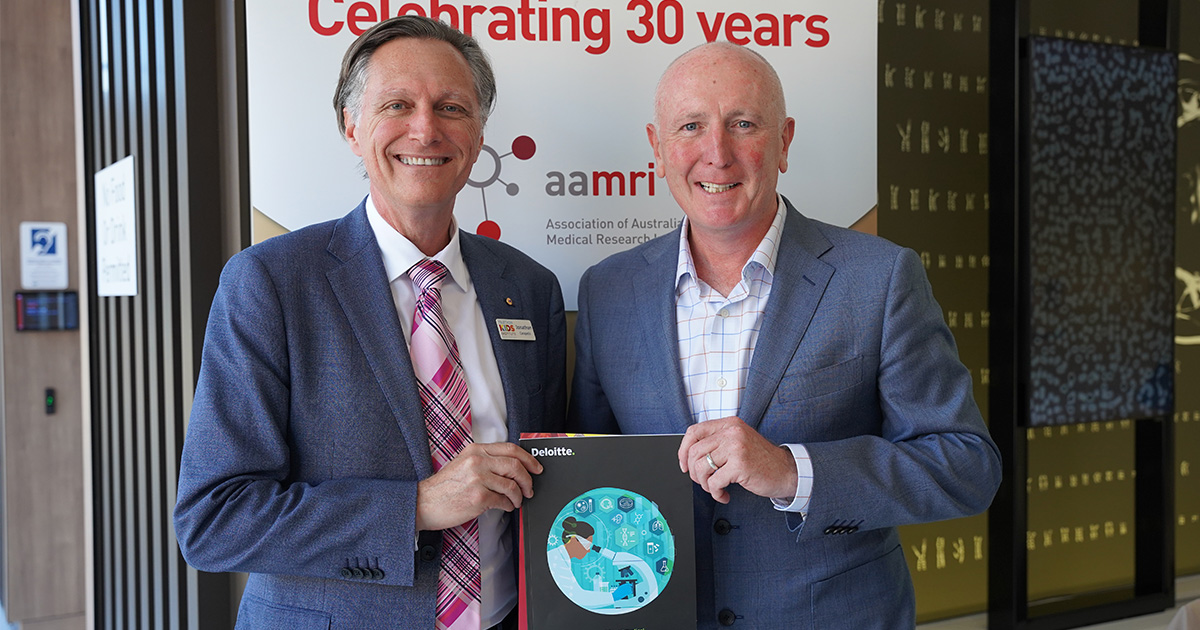Search

News & Events
Announcing our 2025 Premier’s Science Awards finalistsEight outstanding researchers from The Kids Research Institute Australia and the Institute-led Broome STEM Festival are finalists in the 2025 Premier’s Science Awards.

News & Events
Report confirms the economic value of medical research in WAThe Kids Research Institute Australia has welcomed a landmark report which reveals every dollar invested in WA’s medical research sector is more than doubled when it comes to return on investment to our economy.

News & Events
Pitch perfect projects powered by philanthropyEarlier this week ten emerging researchers took to the stage to pitch their projects to a room full of excited and engaged philanthropists who share our vision of happy, healthy kids.

News & Events
Risk of deadly diarrhoeal diseases set to worsen as climate changesResearchers from The Kids Research Institute Australia have contributed to a landmark study revealing climate change will have a detrimental impact on one of the greatest threats to the health of children in the Global south – diarrhoea.
Research
The impact of child self-regulation difficulties on parents: A qualitative studyThe capacity for children to self-regulate is an important developmental task of early childhood, with caregivers playing an integral role in self-regulation development. While caregivers' emotions and behaviors are known to impact child self-regulatory capacity, the impact of child self-regulation difficulties on parents is less understood.
Research
Psychometric validation of the quality of life Inventory − Disability (QI-Disability) among patients with Lennox-Gastaut syndrome and Dravet syndromeTo evaluate the psychometric properties of the Quality of Life Inventory -Disability (QI-Disability) for individuals with Dravet syndrome (DS) or Lennox-Gastaut syndrome (LGS), two rare developmental and epileptic encephalopathy conditions.
Research
Follow-up and Outcomes of Infants Perinatally-exposed to HIV in a Low-prevalence Setting: The Multicenter Children's HIV Exposure Study 2To investigate the follow-up and outcomes of HIV-exposed infants in a setting of low HIV prevalence. This was a multicenter, retrospective study of live-born infants of women known to be living with HIV, at 9 tertiary pediatric centers in Australia and New Zealand from 2009-2025. Antenatal, perinatal, and postnatal data, and outcomes at clinic visits to 18 months of age were collected, including co-morbidities, development, and HIV results.
Research
Six cases of ENPP1 pathogenic variants causing autosomal recessive hypophosphatemic rickets type 2 and generalized arterial calcification of infancyAutosomal recessive hypophosphatemic rickets type 2 (ARHR2) and generalized arterial calcification of infancy (GACI) occur secondary to biallelic ectonucleotide pyrophosphate/phosphodiesterase 1 (ENPP1) loss-of-function pathogenic variants. GACI is a life-threatening condition, often presenting in the neonatal period with heart failure and hypertension, caused by calcification of the media in large- and medium-sized arteries.
Research
Longitudinal surveillance of group A streptococcal pharyngitis and impetigo in remote Western Australian school children informs acute rheumatic fever preventionThe prevalence of impetigo and pharyngitis - which are both superficial group A streptococcus (GAS) infections that precede acute rheumatic fever - is poorly defined. Guidelines recommend the early diagnosis of both infections to prevent ARF; however, screening to enable the concurrent detection of these infections in high-risk populations has rarely been performed.
Research
What is it like living with X-linked hypophosphatemia?: results from an Australian consumer surveyX-linked hypophosphatemia (XLH) is a rare, X-linked dominant condition with a high burden of both physical and psychosocial disease. This study aimed to describe the experience and burden of disease for children and adults living with XLH in Australia by inviting affected individuals and their carers to complete an online questionnaire. Of the 46 responses, half were completed by a person with XLH, and half by carers. Thirty percent were male, 33% were aged less than 18 yr.
